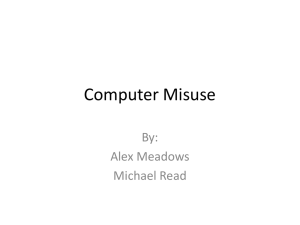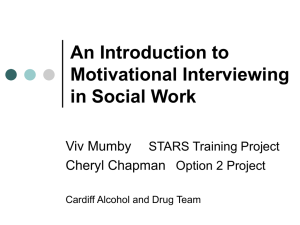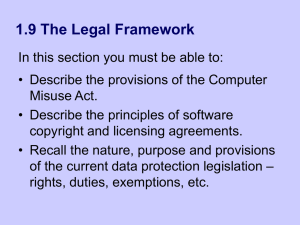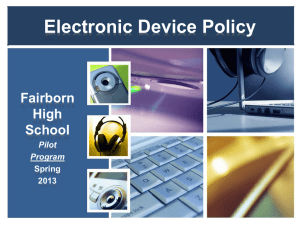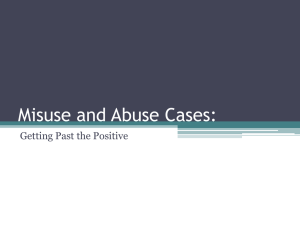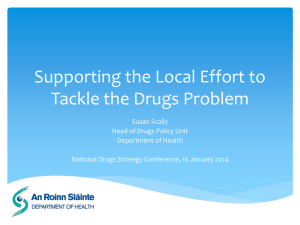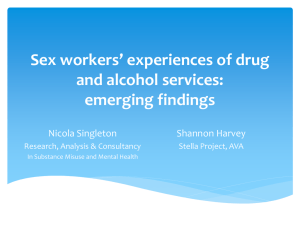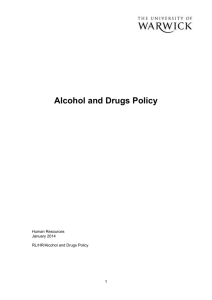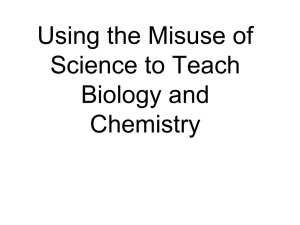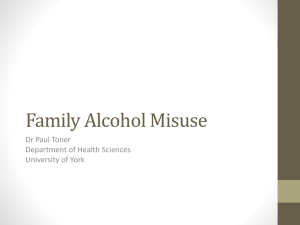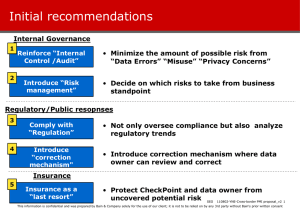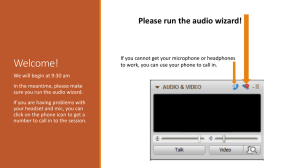Computer Misuse (student presentation 2010)
advertisement
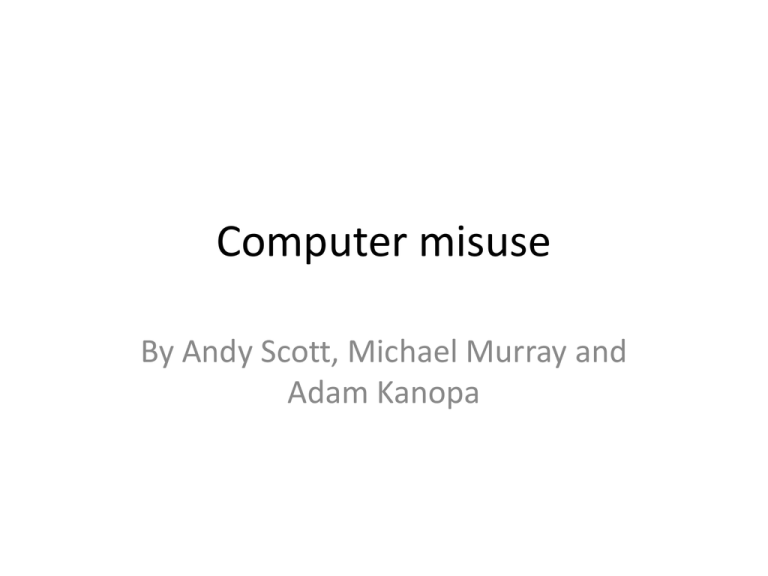
Computer misuse By Andy Scott, Michael Murray and Adam Kanopa Definition The Computer Misuse Act 1990 (CMA) is an act of the UK Parliament passed in 1990. CMA is designed to frame legislation and controls over computer crime and Internet fraud. The legislation was created to: • Criminalize unauthorized access to computer systems. • Deter serious criminals from using a computer in the commission of a criminal offence or seek to hinder or impair access to data stored in a computer. http://searchsecurity.techtarget.co.uk/sDefinition/0,,sid180_gci1293174,00.h tml Computer misuse act 1990 • Introduced 3 criminal offences: • Accessing computer material without permission, eg looking at someone else's files. • Accessing computer material without permission with intent to commit further criminal offences, eg hacking into the bank's computer and wanting to increase the amount in your account. • Altering computer data without permission, eg writing a virus to destroy someone else's data, or actually changing the money in an account. http://www.bbc.co.uk/schools/gcsebitesize/ict/legal/1dataandcomputermisu serev2.shtml Punishment • The offences are punishable as follows: • Offence 1. Up to 6 months' prison and up to £5,000 in fines. • Offences 2 and 3. Up to 5 years in prison and any size of fine (there is no limit). http://impact.freethcartwright.com/2006/08/computer_misuse.html Types of computer misuse • • • • • • • • • Hacking Data misuse and unauthorised transfer or copying Copying and distributing copyrighted software, music and film Email and chat room abuses Pornography Extreme material Identity and financial abuses Fraud and theft Viruses http://www.bbc.co.uk/schools/gcsebitesize/ict/legal/1dataandcomputermisu serev1.shtml Hacking • Hacking is where an unauthorised person uses a network, Internet or modem connection to gain access past security passwords or other security to see data stored on another computer. Hackers sometimes use software hacking tools and often target, for example, particular sites on the Internet. Data misuse and unauthorised transfer or copying • Copying and illegal transfer of data is very quick and easy using online computers and large storage devices such as hard disks, memory sticks and DVDs. Personal data, company research and written work, such as novels and textbooks, cannot be copied without the copyright holder's permission. Copying and distributing copyrighted software, music and film • This includes copying music and movies with computer equipment and distributing it on the Internet without the copyright holder's permission. This is a widespread misuse of both computers and the Internet that breaks copyright regulations. Email and chat room abuses • Internet services such as chat rooms and email have been the subject of many well-publicised cases of impersonation and deception where people who are online pretend to have a different identity. Chat rooms have been used to spread rumours about well known personalities. A growing area of abuse of the Internet is email spam, where millions of emails are sent to advertise both legal and illegal products and services. Pornography • A lot of indecent material and pornography is available through the Internet and can be stored in electronic form. There have been several cases of material, which is classified as illegal, or which shows illegal acts, being found stored on computers followed by prosecutions for possession of the material. Identity and financial abuses • This topic includes misuse of stolen or fictional credit card numbers to obtain goods or services on the Internet, and use of computers in financial frauds. These can range from complex well thought out deceptions to simple uses such as printing counterfeit money with colour printers. Viruses • Viruses are relatively simple programs written by people and designed to cause nuisance or damage to computers or their files. Preventing misuse • The Data Protection Act • This was introduced to regulate personal data. This helps to provide protection against the abuse of personal information. Find out more about the Data Protection Act. • Copyright law • This provides protection to the owners of the copyright and covers the copying of written, musical, or film works using computers. FAST is the industry body which is against software theft. You can find out more about it in the Copyright section. • There have been cases where laws such as Copyright have been used to crack down on file sharing websites or individuals who store and illegally distribute copyrighted material, eg music. There is a massive problem with many people around the world obtaining copyrighted material illegally. Close down chat rooms • Some chat rooms have been closed down due to abuses, especially where children are vulnerable. Some have moderators who help to prevent abuses. Advice about sensible use is important; especially to never give personal contact details or arrange meetings without extreme caution. Reduce email spamming • This may be reduced by: • never replying to anonymous emails • setting filters on email accounts • reporting spammers to ISPs, who are beginning to get together to blacklist email abusers • governments passing laws to punish persistent spammers with heavy fines Regular backups and security • Just making something illegal or setting up regulations does not stop it happening. Responsible computer users need to take reasonable steps to keep their data safe. This includes regular backups and sufficient security with passwords. Real life computer misuse… Gary Mckinnon !!THE END!! Any questions?
